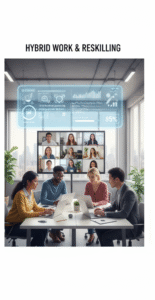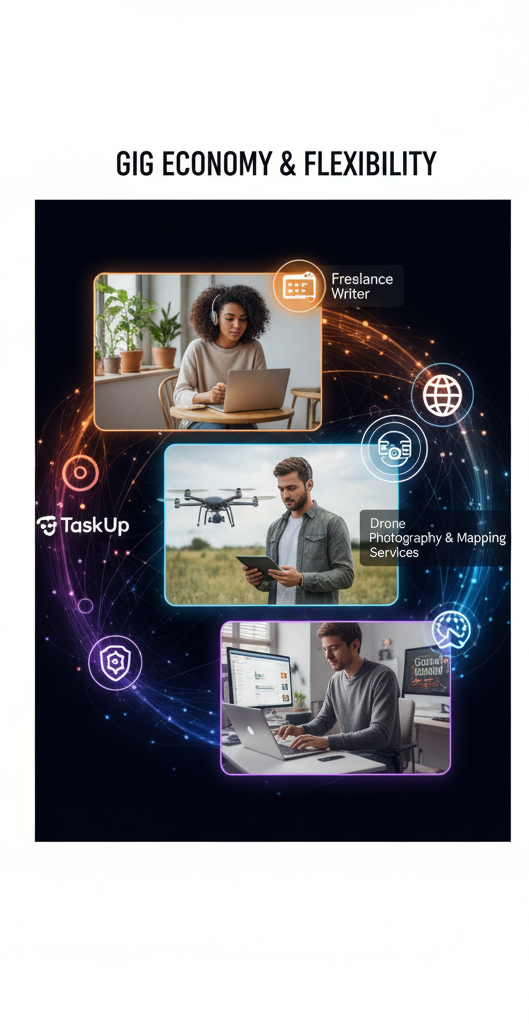The modern workplace is undergoing one of the most profound transformations in history. The way people work, where they work, and the skills they need to stay relevant are evolving faster than ever before. From hybrid and remote work models to reskilling initiatives and the growing influence of the gig economy, technology and flexibility are shaping the new world of work.

- The Rise of Hybrid and Remote Work Models
The COVID-19 pandemic accelerated what was already becoming a growing trend: the ability to work from anywhere. As offices reopened, many companies adopted a hybrid approach — a balance between on-site and remote work. This model offers flexibility while maintaining collaboration and team culture.
Hybrid work has proven to increase employee satisfaction and productivity. Workers save commuting time and enjoy a better work-life balance, while employers benefit from access to a wider talent pool. However, this new setup also presents challenges, such as maintaining company culture, ensuring data security, and avoiding burnout due to blurred boundaries between home and office.
To adapt successfully, businesses are investing in digital infrastructure — cloud systems, collaborative tools, and cybersecurity frameworks. The future belongs to organizations that can blend flexibility with structure and ensure that employees stay connected, productive, and engaged no matter where they are.
- Reskilling and Upskilling: Staying Relevant in the Age of Automation
As artificial intelligence (AI), machine learning, and automation reshape industries, the demand for new skills is skyrocketing. Traditional roles are being redefined, and new positions are emerging that require a mix of technical and human-centered capabilities.
Reskilling and upskilling are no longer optional — they are essential. Employees who continuously learn and adapt will have a competitive edge, while organizations that invest in training will future-proof their workforce.
Key areas where professionals are reskilling include:
- Digital literacy and data analysis
- AI and automation tools
- Creative problem-solving and critical thinking
- Emotional intelligence and leadership
Governments and businesses are also partnering to create programs that make learning more accessible. Online courses, micro-credentials, and flexible learning platforms are empowering workers to gain new skills at their own pace.
- The Gig Economy: Flexibility Meets Opportunity
The gig economy — characterized by freelance, project-based, and contract work — is becoming a central part of the global labor market. Millions of professionals are choosing independence over traditional employment, valuing flexibility, autonomy, and variety in their work.
Platforms like Upwork, Fiverr, and Freelancer have enabled skilled professionals to find global clients, while companies benefit from on-demand expertise. However, this shift also brings challenges, such as income instability and lack of traditional employment benefits.
To build a sustainable gig economy, policies need to evolve. Fair pay, worker protections, and access to benefits like healthcare and retirement plans will be crucial. Forward-thinking governments and businesses are already experimenting with hybrid models that combine gig flexibility with corporate stability.
- Technology: The Driving Force Behind Change
Technology is the thread connecting all these changes. Cloud computing, AI, robotics, and digital communication tools are redefining how businesses operate and how employees interact. Automation is taking over repetitive tasks, while humans focus on creativity, strategy, and relationship-building.
At the same time, digital transformation has made global collaboration possible. Teams can now work across continents seamlessly. For employers, it means access to diverse perspectives; for employees, it means more opportunities regardless of geography.
- The Human Side of the Future of Work
Amid all the technological advancement, one truth remains — the human factor is irreplaceable. Companies that prioritize well-being, inclusion, and flexibility are more likely to attract and retain top talent. Employees now seek purpose-driven work, supportive management, and mental health awareness in the workplace.
The future of work isn’t just about machines or algorithms; it’s about creating systems where humans and technology thrive together.
Conclusion
The future of work is not coming — it’s already here. Hybrid work models, lifelong learning, and the gig economy are rewriting the rules of employment. To succeed in this new era, both individuals and organizations must embrace adaptability, invest in continuous learning, and harness technology responsibly.
Those who see change as an opportunity rather than a threat will lead the next chapter of the global workforce revolution.

